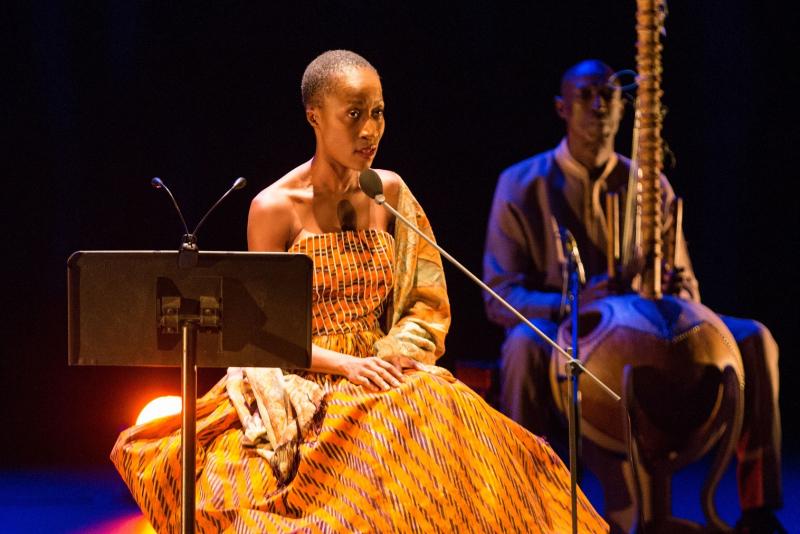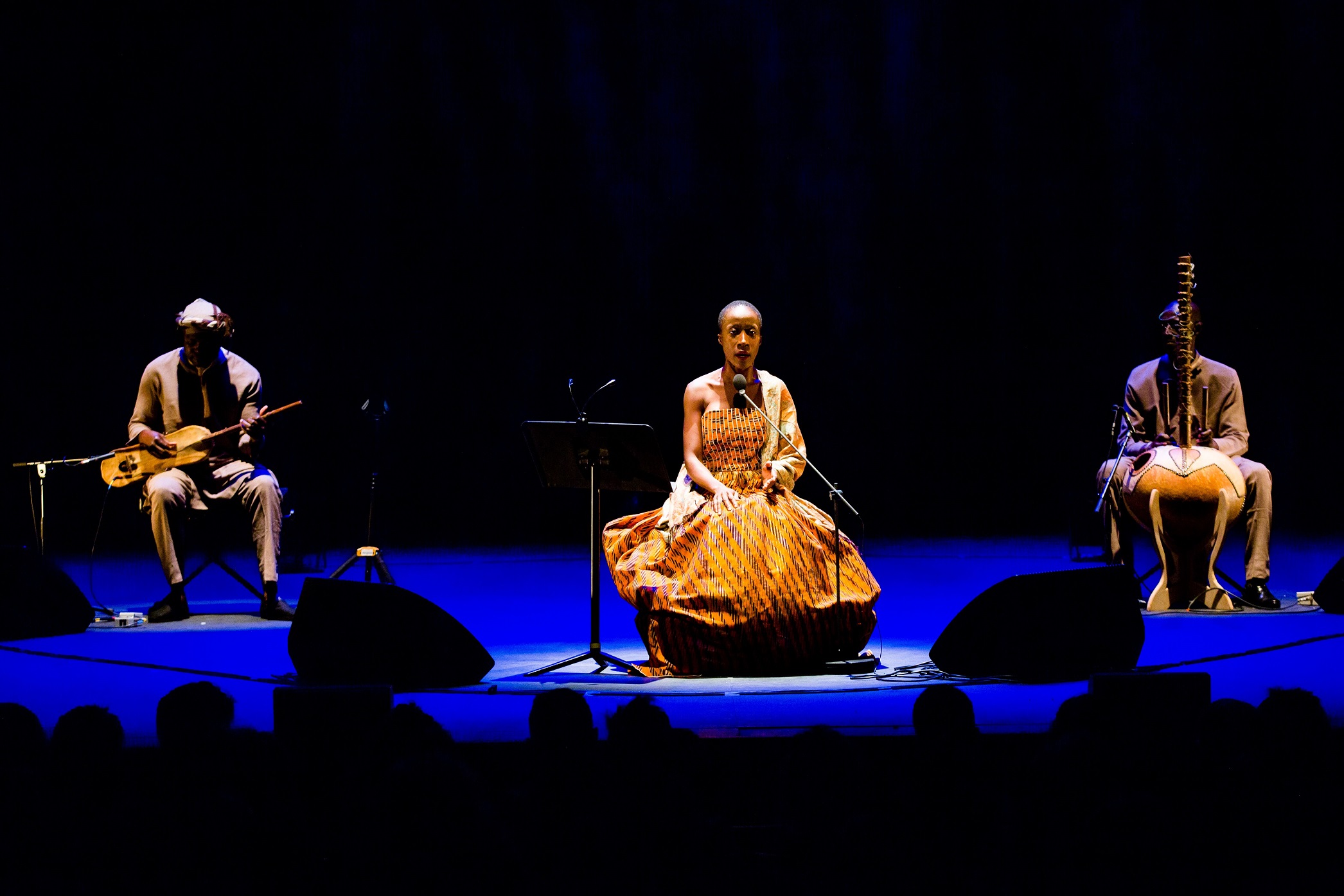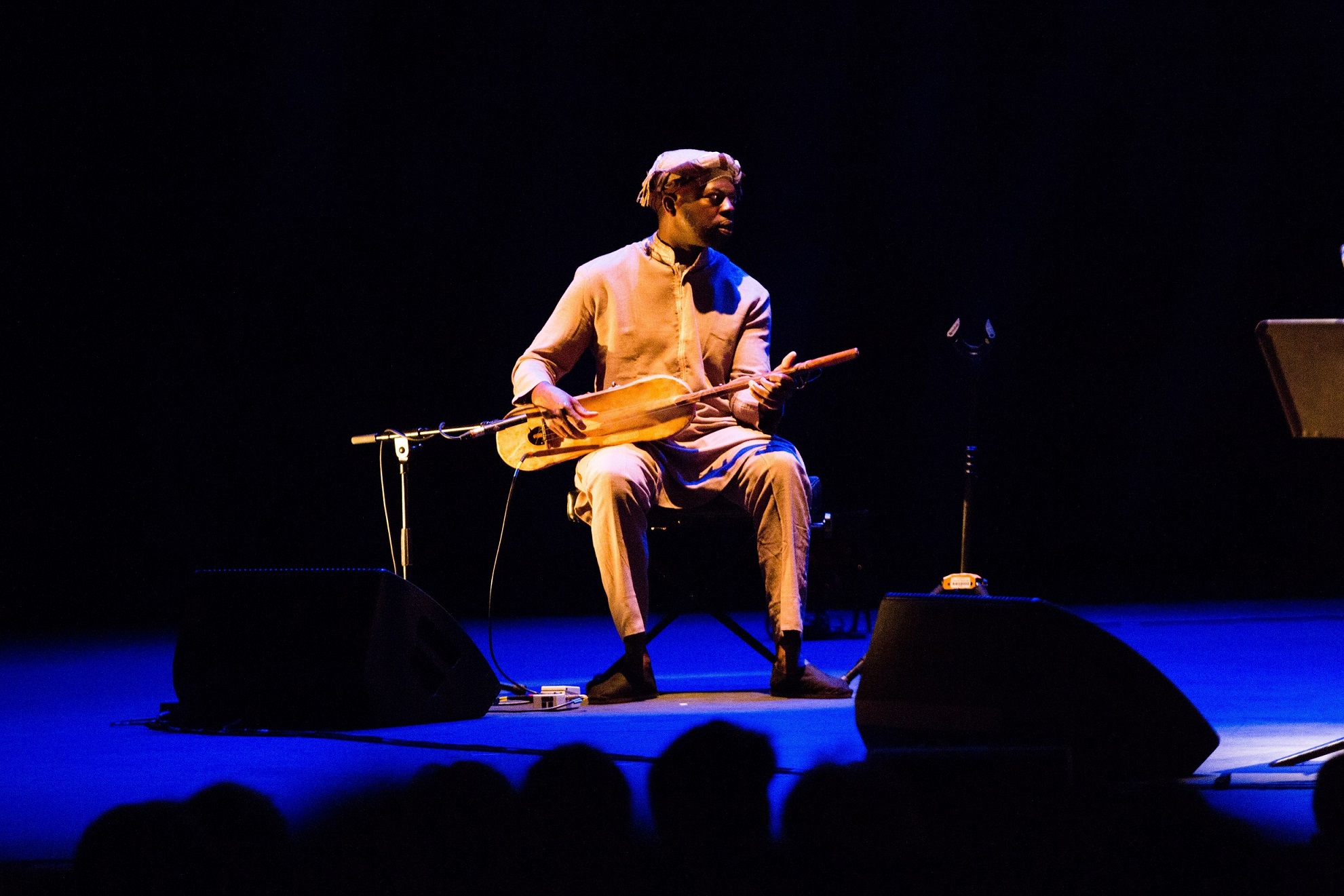Rokia Traoré: Dream Mandé: Djata, Brighton Festival 2019 review – resonant griot wisdom | reviews, news & interviews
Rokia Traoré: Dream Mandé: Djata, Brighton Festival 2019 review – resonant griot wisdom
Rokia Traoré: Dream Mandé: Djata, Brighton Festival 2019 review – resonant griot wisdom
Home truths as Malian tales transfix the South Coast

Rokia Traoré’s passage through this year’s Brighton Festival has been central, binding it to her Malian identity in a series of gigs. This hands-on Guest Director’s pulsing Afro-rock Opening Night was followed by the first Dream Mandé show’s recasting of traditional sounds. A Malian Dance Night added FGM protest, Seventies s.f.-soundtracked myth and cheeky wit from young choreographers.
The griot’s role at the root of West African culture, orally transmitting culture over centuries from within a restricted caste, is a familiar backdrop to contemporary musicians’ stories, as a tradition drawn, excluded or broken from. Traoré simply becomes a griot for the audience sitting somewhat uncertainly in the incongruous 19th century Theatre Royal. Wearing ripped jeans when she launched the Festival, tonight her dress billows beneath her like Lewis Carroll’s wisdom-dispensing caterpillar’s mushroom seat. Without preamble, she begins her version of the Epic of Sundiata, the foundation legend of the Mali Empire, which flourished in the 13th and 14th centuries, leaving mediaeval England in the shade.
 An ngoni and a kora player provide a constant backdrop, subtly shifting rhythms and giving folkish lilts within melodic cycles, as Traoré sings with customary control. She speaks with a steady, hypnotic, husky voice, which drops and cracks as if scraped reedily thin by endlessly telling such tales. Making the Theatre Royal’s stage an unfamiliar ritual space, she is enacting the role of ancient griot (having learned from the real thing back home, somewhat more matter of factly, you’d suspect).
An ngoni and a kora player provide a constant backdrop, subtly shifting rhythms and giving folkish lilts within melodic cycles, as Traoré sings with customary control. She speaks with a steady, hypnotic, husky voice, which drops and cracks as if scraped reedily thin by endlessly telling such tales. Making the Theatre Royal’s stage an unfamiliar ritual space, she is enacting the role of ancient griot (having learned from the real thing back home, somewhat more matter of factly, you’d suspect).
This performance requires patience and quiet, giving little quarter and only slowly releasing its narrative riches, as Traoré takes us to the court of Naré Maghann Konaté. Much intrigue and stories within stories follow. There are social details of hunters’ mystical attuning to nature – the Traoré tribe being their elite - and courtly virtues, where women know “how to wear the right smile”. A quest to kill a rampaging buffalo echoes universal childhood tales, as the heroes enter a glade where “all help from outside our deepest nature will be in vain”, and an old crone proves to be the buffalo, advising on her own defeat. The animistic dream-states of modern, rural Thailand in Apichatpong Weerasethakul’s films come to mind.
 Finally, Traoré steps out of her tale with its point, as the Mali Empire is built on the Kouroukan Fouga, an oral constitution including, in Traoré’s reading: “No one will put the bite in his mouth of his fellow man”; and “power has never made a small mind greater”. Wikipedia-level research hardly worthy of a griot suggests slavery persisted in the Empire, though with strictures allowing rest and barring mistreatment. “It is important to have our own version of our own history,” Traoré anyway reasonably states. “Long before slavery, long before colonisation, Africa had a civilisation.” She calls the Mali Empire the first democracy. “We are,” she says, “proud.” As the period’s English kings hadn’t a pot to piss in compared to Mali’s lavishly generous Muslim emperors, Eurocentric history certainly needs revisiting.
Finally, Traoré steps out of her tale with its point, as the Mali Empire is built on the Kouroukan Fouga, an oral constitution including, in Traoré’s reading: “No one will put the bite in his mouth of his fellow man”; and “power has never made a small mind greater”. Wikipedia-level research hardly worthy of a griot suggests slavery persisted in the Empire, though with strictures allowing rest and barring mistreatment. “It is important to have our own version of our own history,” Traoré anyway reasonably states. “Long before slavery, long before colonisation, Africa had a civilisation.” She calls the Mali Empire the first democracy. “We are,” she says, “proud.” As the period’s English kings hadn’t a pot to piss in compared to Mali’s lavishly generous Muslim emperors, Eurocentric history certainly needs revisiting.
Traoré finishes by singing with resonant strength, head up, staring straight at us. Like Sidney Poitier in America’s Sixties, she sometimes seems to carry pride and dignity on Mali’s behalf, refined and perhaps restricted by her role’s weight. The lessons she is leaving in Brighton are worth it for us.
rating
Explore topics
Share this article
The future of Arts Journalism
You can stop theartsdesk.com closing!
We urgently need financing to survive. Our fundraising drive has thus far raised £49,000 but we need to reach £100,000 or we will be forced to close. Please contribute here: https://gofund.me/c3f6033d
And if you can forward this information to anyone who might assist, we’d be grateful.

Subscribe to theartsdesk.com
Thank you for continuing to read our work on theartsdesk.com. For unlimited access to every article in its entirety, including our archive of more than 15,000 pieces, we're asking for £5 per month or £40 per year. We feel it's a very good deal, and hope you do too.
To take a subscription now simply click here.
And if you're looking for that extra gift for a friend or family member, why not treat them to a theartsdesk.com gift subscription?
more New music
 theartsdesk Q&A: Soft Cell
Upon the untimely passing of Dave Ball we revisit our September 2018 Soft Cell interview
theartsdesk Q&A: Soft Cell
Upon the untimely passing of Dave Ball we revisit our September 2018 Soft Cell interview
 Demi Lovato's ninth album, 'It's Not That Deep', goes for a frolic on the dancefloor
US pop icon's latest is full of unpretentious pop-club bangers
Demi Lovato's ninth album, 'It's Not That Deep', goes for a frolic on the dancefloor
US pop icon's latest is full of unpretentious pop-club bangers
 Yazmin Lacey confirms her place in a vital soul movement with 'Teal Dreams'
Intimacy and rich poetry on UK soul star's second LP
Yazmin Lacey confirms her place in a vital soul movement with 'Teal Dreams'
Intimacy and rich poetry on UK soul star's second LP
 Solar Eyes, Hare & Hounds, Birmingham review - local lads lay down some new tunes for a home crowd
Psychedelic indie dance music marinated in swirling dry ice
Solar Eyes, Hare & Hounds, Birmingham review - local lads lay down some new tunes for a home crowd
Psychedelic indie dance music marinated in swirling dry ice
 The Lemonheads' 'Love Chant' is a fine return to form
Evan Dando finally gets back in the saddle with an album of new tunes
The Lemonheads' 'Love Chant' is a fine return to form
Evan Dando finally gets back in the saddle with an album of new tunes
 Music Reissues Weekly: Evie Sands - I Can’t Let Go
Diligent, treasure-packed tribute to one of Sixties’ America’s great vocal stylists
Music Reissues Weekly: Evie Sands - I Can’t Let Go
Diligent, treasure-packed tribute to one of Sixties’ America’s great vocal stylists
 'Deadbeat': Tame Impala's downbeat rave-inspired latest
Fifth album from Australian project grooves but falls flat
'Deadbeat': Tame Impala's downbeat rave-inspired latest
Fifth album from Australian project grooves but falls flat
 Heartbreak and soaring beauty on Chrissie Hynde & Pals' Duets Special
The great Pretender at her most romantic and on the form of her life
Heartbreak and soaring beauty on Chrissie Hynde & Pals' Duets Special
The great Pretender at her most romantic and on the form of her life
 The Last Dinner Party's 'From the Pyre' is as enjoyable as it is over-the-top
Musically sophisticated five-piece ramp up the excesses but remain contagiously pop
The Last Dinner Party's 'From the Pyre' is as enjoyable as it is over-the-top
Musically sophisticated five-piece ramp up the excesses but remain contagiously pop
 Moroccan Gnawa comes to Manhattan with 'Saha Gnawa'
Trance and tradition meet Afrofuturism in Manhattan
Moroccan Gnawa comes to Manhattan with 'Saha Gnawa'
Trance and tradition meet Afrofuturism in Manhattan
 Soulwax’s 'All Systems Are Lying' lays down some tasty yet gritty electro-pop
Belgian dancefloor veterans return to the fray with a dark, pop-orientated sound
Soulwax’s 'All Systems Are Lying' lays down some tasty yet gritty electro-pop
Belgian dancefloor veterans return to the fray with a dark, pop-orientated sound
 Music Reissues Weekly: Marc and the Mambas - Three Black Nights Of Little Black Bites
When Marc Almond took time out from Soft Cell
Music Reissues Weekly: Marc and the Mambas - Three Black Nights Of Little Black Bites
When Marc Almond took time out from Soft Cell

Add comment